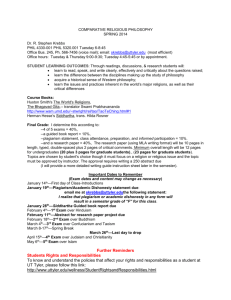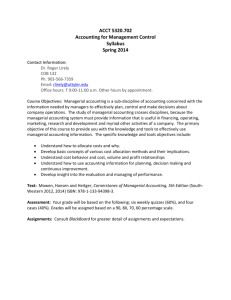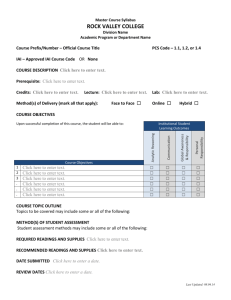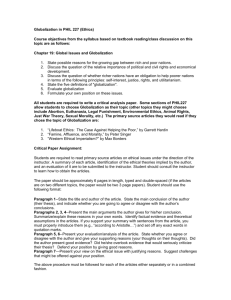SOCI 2330-001 Social Change and Development
advertisement
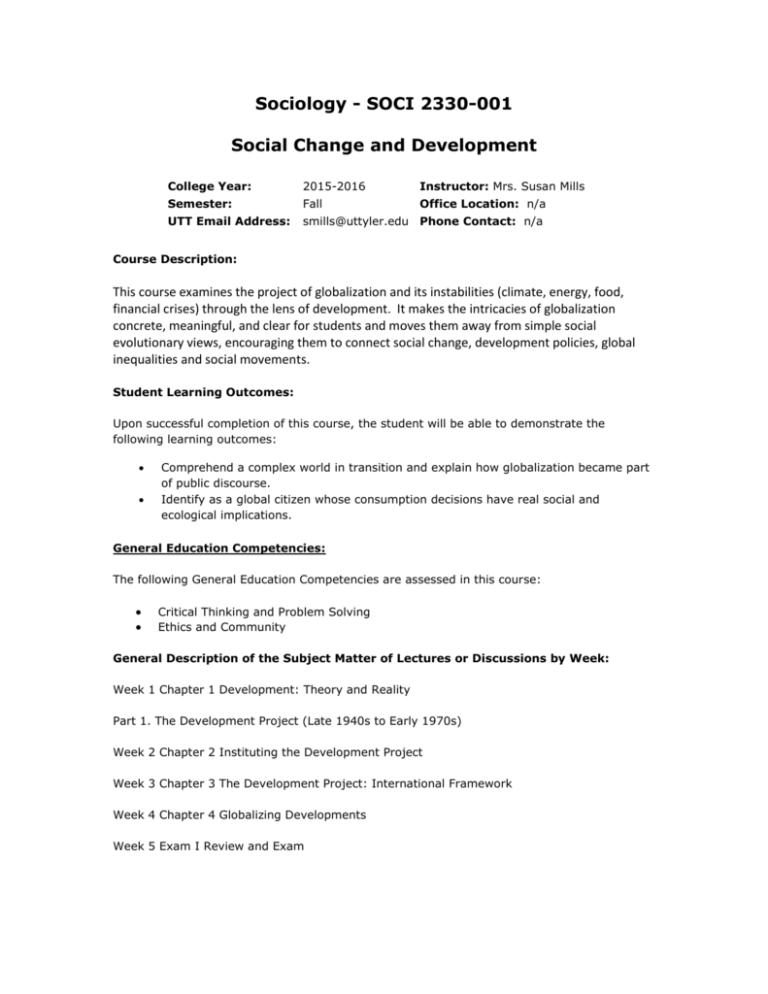
Sociology - SOCI 2330-001 Social Change and Development College Year: 2015-2016 Instructor: Mrs. Susan Mills Semester: Fall Office Location: n/a UTT Email Address: smills@uttyler.edu Phone Contact: n/a Course Description: This course examines the project of globalization and its instabilities (climate, energy, food, financial crises) through the lens of development. It makes the intricacies of globalization concrete, meaningful, and clear for students and moves them away from simple social evolutionary views, encouraging them to connect social change, development policies, global inequalities and social movements. Student Learning Outcomes: Upon successful completion of this course, the student will be able to demonstrate the following learning outcomes: Comprehend a complex world in transition and explain how globalization became part of public discourse. Identify as a global citizen whose consumption decisions have real social and ecological implications. General Education Competencies: The following General Education Competencies are assessed in this course: Critical Thinking and Problem Solving Ethics and Community General Description of the Subject Matter of Lectures or Discussions by Week: Week 1 Chapter 1 Development: Theory and Reality Part 1. The Development Project (Late 1940s to Early 1970s) Week 2 Chapter 2 Instituting the Development Project Week 3 Chapter 3 The Development Project: International Framework Week 4 Chapter 4 Globalizing Developments Week 5 Exam I Review and Exam Part 2. The Globalization project (1980s to 2000s) Week 6 Chapter 5 Instituting the Globalization Project Week 7 Chapter 6 The Globalization Project in Practice Week 8 Chapter 7 Global Countermovements Week 9 Exam II Review and Exam Week 10 Field Project Part 3. Millennial Reckonings (2000s to Present) Week 11 Chapter 8 The Globalization Project in Crisis Week 12 Chapter 9 The Sustainability Project Week 13 Chapter 10 Rethinking Development Week 14 Thanksgiving Week Week 15 The McDonaldization of Society Week 16 Review Final Exam (non-comprehensive) Important University Dates: 8/24 Classes Begin 9/4 Census Date (11th Class Day) 9/7 Labor Day (University Closed) 10/26 Last Day to Withdraw ‘W’ from Classes 11/23-11/28 Thanksgiving Holiday 12/7 Study Day 12/7-12/12 Final Exams for Fall Term 12/12 End of Fall Term List of Textbook(s) and Required and Recommended Readings: Development and Social Change: A Global Perspective, 5/E, Philip McMichael, 978141299207, Sage Publications ©2014 ISBN: The McDonaldization of Society, 8/E, George Ritzer, ISBN:9781483358949, Sage Publications © 2015 Technology Requirements: Computer access with Internet is necessary. If you do not have personal access, you may use the computer lab on campus. Additional Materials and Supplies Required: None required. Methods of Evaluation: Exam I 25%, Exam II 25%, Field Project 25%, and Final Exam 25%. There are NO MAKE-UP EXAMS. The Final Exam grade may be substituted for ONE ONLY missed Exam I or II. It is recommended that students take their exams on time per the syllabus schedule. There will be a Field Project assignment where students will go out into the community to observe and/or participate in a designated activity. This sociological field observation/participation will be reported in a short paper of 5 to 6 pages and turnedin with the Final Exam. The Field Project is worth a test grade, or 25% of the final grade. The exact requirements of the Field Project will be discussed in class during the semester. The Final Exam is non-comprehensive. Expected Classroom Etiquette If you attend this class or a portion of this class on-campus then class etiquette dictates that you will: 1. Attend class each time the class meets. Attendance is considered mandatory and roll will be taken. Frequent absences may result in loss of a letter grade from the final grade. 2. Be on time for class and remain for the entire period. This is considered as partial attendance and may be considered an absence. You are inconsiderate of your classmates if you arrive late and leave early. 3. Refrain from talking while the professor is lecturing. Idle chattering and giggling are disruptive to the class and disrespectful to your professor and your classmates. 4. Without prior approval from your professor, do not use cell-phones, computers, or any other electronic devices in class. Otherwise, you may be asked to leave the classroom. 5. Be attentive and participate in class. Academic Dishonesty Academic dishonesty (cheating on an exam or plagiarizing another’s work) will not be tolerated in this class. Any student suspected of or caught in the act of academic dishonesty will be immediately reported to the appropriate University authority. Academic dishonesty is considered extremely serious and may result in suspension and a failing grade. Policies: http://www.uttyler.edu/academicaffairs/syllabuspolicies.pdf Students Rights and Responsibilities To know and understand the policies that affect your rights and responsibilities as a student at UT Tyler, please follow this link: http://www.uttyler.edu/wellness/StudentRightsandResponsibilities.html Grade Replacement/Forgiveness If you are repeating this course for a grade replacement, you must file an intent to receive grade forgiveness with the registrar by the 12th day of class. Failure to do so will result in both the original and repeated grade being used to calculate your overall grade point average. Undergraduates will receive grade forgiveness (grade replacement) for only three course repeats; graduates, for two course repeats during his/her career at UT Tyler. State-Mandated Course Drop Policy Texas law prohibits a student who began college for the first time in Fall 2007 or thereafter from dropping more than six courses during their entire undergraduate career. This includes courses dropped at another 2-year or 4-year Texas public college or university. For purposes of this rule, a dropped course is any course that is dropped after the 12th day of class (See Schedule of Classes for the specific date). Exceptions to the 6-drop rule may be found in the catalog. Petitions for exemptions must be submitted to the Registrar's Office and must be accompanied by documentation of the extenuating circumstance. Please contact the Registrar's Office if you have any questions. Disability Services In accordance with federal law, a student requesting accommodation must provide documentation of his/her disability to the Disability Support Services counselor. If you have a disability, including a learning disability, for which you request an accommodation, please contact Ida MacDonald in the Disability Support Services office in UC 282, or call (903) 566-7079. Student Absence due to Religious Observance Students who anticipate being absent from class due to a religious observance are requested to inform the instructor of such absences by the second class meeting of the semester. Student Absence for University-Sponsored Events and Activities If you intend to be absent for a university-sponsored event or activity, you (or the event sponsor) must notify the instructor at least two weeks prior to the date of the planned absence. At that time the instructor will set a date and time when make-up assignments will be completed. Social Security and FERPA Statement: It is the policy of The University of Texas at Tyler to protect the confidential nature of social security numbers. The University has changed its computer programming so that all students have an identification number. The electronic transmission of grades (e.g., via e-mail) risks violation of the Family Educational Rights and Privacy Act; grades will not be transmitted electronically. Emergency Exits and Evacuation: Everyone is required to exit the building when a fire alarm goes off. Follow your instructor’s directions regarding the appropriate exit. If you require assistance during an evacuation, inform your instructor in the first week of class. Do Not re-enter the building unless given permission by University Police, Fire department, or Fire Prevention Service.
